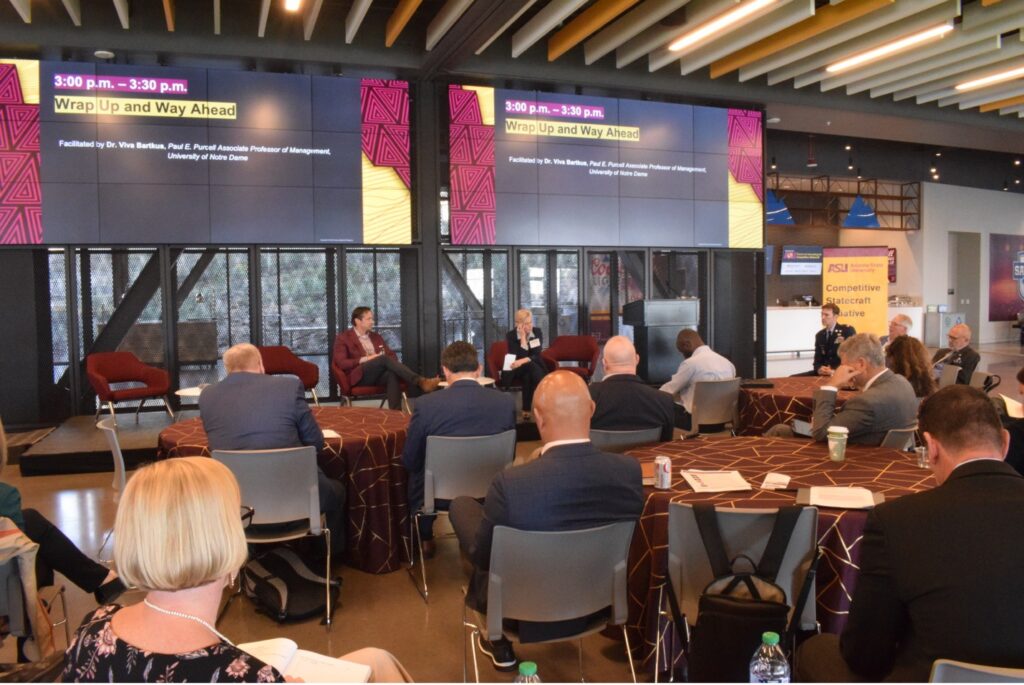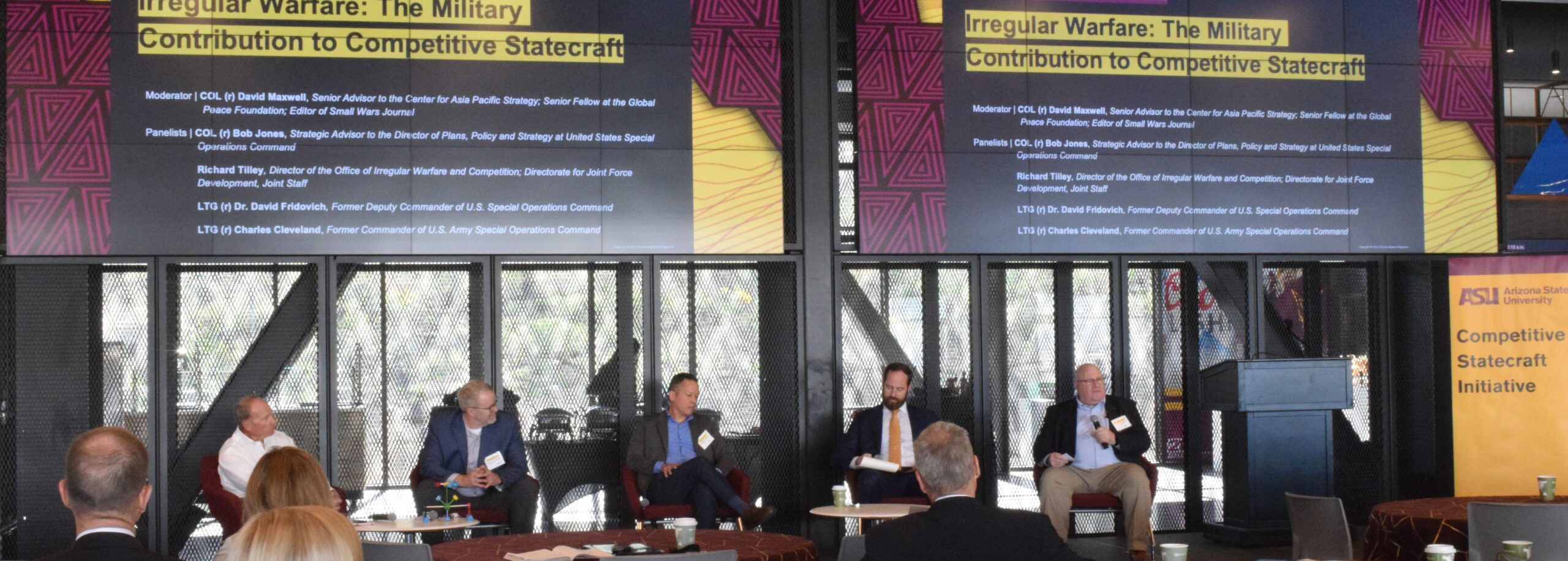
ASU Forum on Innovating for Competitive Statecraft at Arizona State University in Tempe
About the Forum
To prevail in today’s complex and competitive international environment, the U.S. must harness all the instruments of national power; no one instrument is sufficient when employed without—or even out of synch with—the others. The Notre Dame-RAND Inaugural Forum explored this challenge in September of 2022, with its focus on “Harnessing the Power of Democratic Societies: Toward a More Inclusive American Grand Strategy.” Since then, the National Security Strategy and National Defense Strategy have offered integrated deterrence and campaigning as the ways by which we’ll achieve our strategic ends.
The ASU Forum advanced this conversation, further exploring various instruments of national power with a focus on how they might be sharpened for strategic competition and integrated with the others in support of what we call “Competitive Statecraft”, the integration and synchronization of all instruments of national power in deliberate campaigns during both peace and war to secure the nation’s interest and advance its values.
The American Diplomacy Project: A U.S. Diplomatic Service for the 21st Century
Our allies, friends, and competitors are expanding their diplomatic activities to increase their influence and advance national objectives. The United States will need the most modern, expert, and agile diplomatic service to compete successfully. The American Diplomacy Project proposes a substantial change, offering a plan of action for a new generation of American diplomats to meet the demands of American foreign policy today.
Moderator | Ambassador Michael Polt, ASU Ambassador-in-Residence and Professor of Practice, Co- founder, Leadership, Diplomacy, and National Security Lab
Panelists | Ambassador Marcie Ries, Co-chair of the American Diplomacy Project Phase 2 Ambassador Marc Grossman, Former Under Secretary of State for Political Affairs
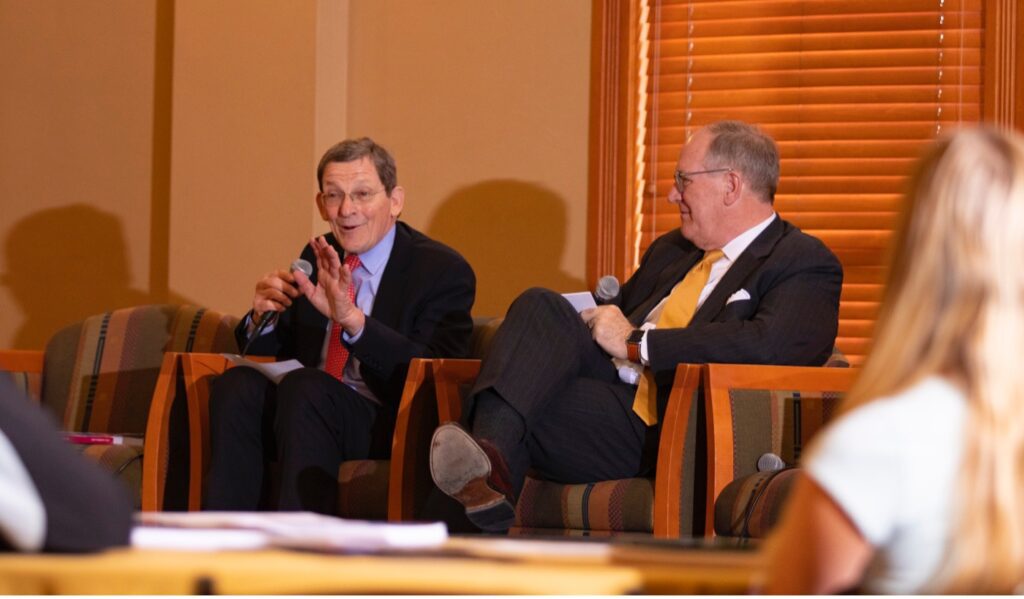
Lawfare: Legal Accountability Under International Law as a Strategic Tool
Using international humanitarian law (IHL) to hold states and individuals legally accountable for violating the national sovereignty of other states and other grave violations of IHL can serve as a powerful deterrent to rogue state actors. What are the limitations of this approach? What are the obstacles to integrating these legal tools into whole-of-government campaigns?
Panelists | Professor David Scheffer, First U.S. Ambassador-at-Large for War Crimes Professor Victor Peskin, ASU School of Politics and Global Studies

Preparing Leaders for Competitive Statecraft: The Public Service Academy
We need leaders who are educated, trained, and inspired to serve in our complex and rapidly changing world; Character-Driven Leaders who understand how to selflessly serve across inter-agency and private- sector boundaries to produce results; women and men who understand the elements of national power and how the United States can achieve impact at home and abroad. This panel will discuss how Arizona State University has taken on this challenge by creating the first Public Service Academy to prepare leaders to achieve positive results in an era of strategic competition.
Moderator | LTG (r) Ben Freakley, Special Advisor to ASU President Michael Crow for Leadership Initiatives; ASU Professor of Practice of Leadership; Co-founder, Leadership, Diplomacy, and National Security Lab
Panelists | Cindy Parnell, Chief of Public Service for ASU’s Watts College of Public Service and Community Solutions
Brett Hunt, Director of Next Generation Service Initiatives at The Volcker Alliance

Innovating Locally to Compete Globally
The most recent National Security Strategy emphasizes the role of domestic investments in maintaining our global competitive edge, especially in critical and emerging technologies. From Phoenix to Fairbanks, regional hubs across the United States are now the tip of the spear in a global competition to establish clusters for inventing and scaling critical tech. What does a regional approach to technology hubs mean for national security? How does the U.S. approach to regional technology hubs compare to our allies and adversaries?
Moderator | Kevin McGinnis, ASU Managing Director for Strategic Technology Initiatives Panelists | Ian O’Grady, Policy Advisor to Arizona Governor Katie Hobbs
Jonathan Kreiss-Tomkins, Senior Advisor to America Achieves
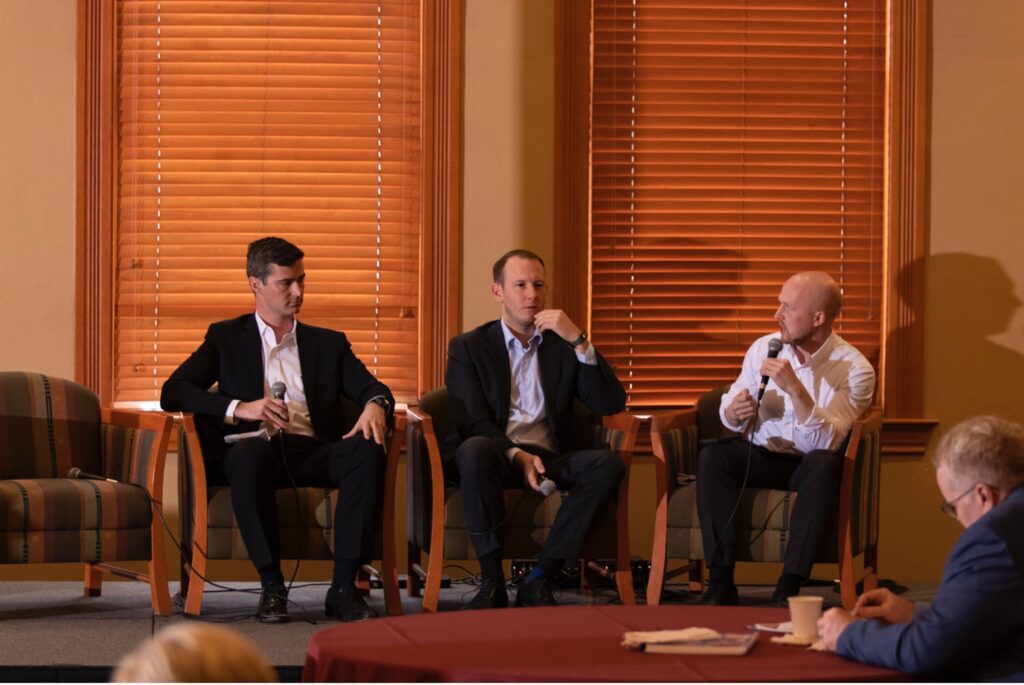
Building Allied S&T Ecosystems for Strategic Competition
President Biden has called this a ‘decisive decade’ in part because of the impact emerging technologies will have on geopolitical leadership, international stability, and the contest between democracy and autocracy. With competitors seeking to lead in areas such as artificial intelligence, 5G, and quantum computing, democratic allies must find more effective ways to collaborate on science and technology development and operationalization. What are some current opportunities for increased cross-border collaboration on science and technology? What obstacles will need to be overcome?
Moderator | Dr. Nadya Bliss, Executive Director of the ASU Global Security Initiative; Professor of Practice and Graduate Faculty at the School of Computing and Augmented Intelligence
Panelists | Dr. Sarah Sewall, Executive Vice President for Strategic Issues at In-Q-Tel
VAdm (r) Paul Maddison, Director of the Defense Research Institute and Professor of Practice at the University of New South Wales in Sydney
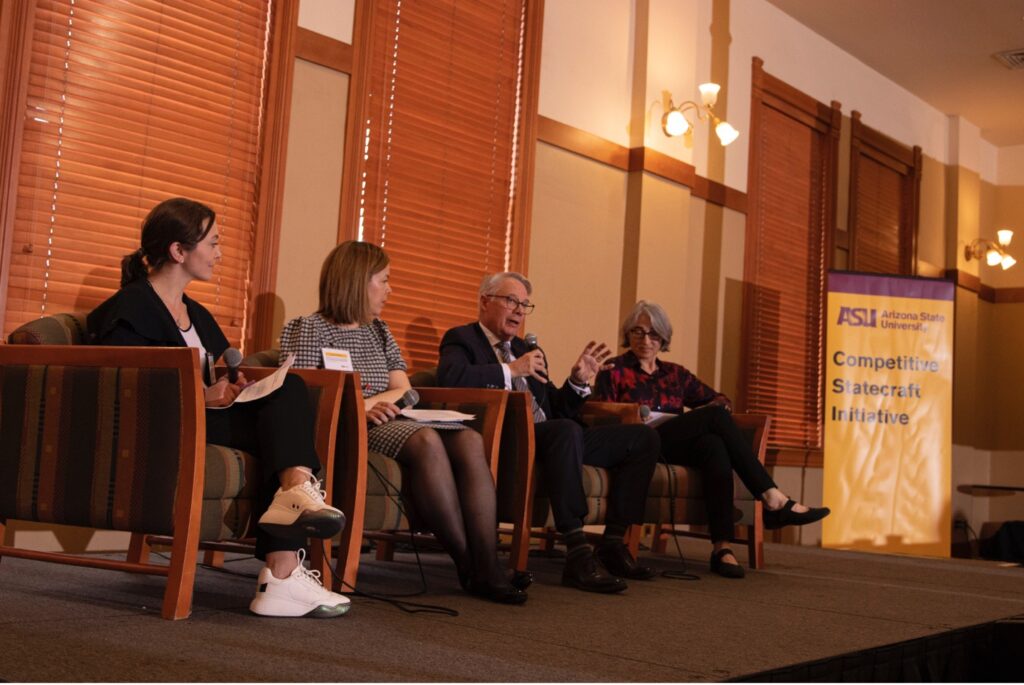
Partnering for Defense Tech Acceleration
Military overmatch is the essential backstop that keeps great power competition from turning into great power conflict. To maintain overmatch, the Defense Department and the military services need timely access to the best dual-use technologies that can be developed and rapidly transitioned. How are academia, industry, and government partnering for competitive advantage? What more can be done?
Moderator | Drew Trojanowski, Asst. Vice President of Strategic Initiatives, ASU Knowledge Enterprise
Panelists | Samantha Hiller, University Program Director for the National Security Innovation Network Lt. Col. Paul Griffith, Deputy Director for Plans, Requirements, Programs and Assessments at U.S. Air Force, Southern Command
Taj Holmes, Technologist, U.S. Indo-Pacific Command, G9 Concepts

Land Powers, Sea Powers, and Falling Skies
As strategic competition intensifies between the U.S. and authoritarian adversaries, many wonder whether our system of shared and separated powers and our polarized body politic are up to the challenge. Is the sky really falling? Must we mimic our adversaries to compete with them, or can what looks like dysfunction belie enduring strategic advantages? Walter Russell Mead will explore the centuries-long history of competition and conflict between liberal maritime powers and illiberal land powers to see how it might help illuminate the present moment and point toward productive ways ahead.
Speaker | Walter Russell Mead, Ravenel B. Curry III Distinguished Fellow in Strategy and Statesmanship at Hudson Institute; Global View Columnist at The Wall Street Journal; James Clarke Chace Professor of Foreign Affairs and Humanities at Bard College in New York

Grand Strategy and the Contribution of the Humanities to Statecraft
While mainstay premises of post-Cold War U.S. foreign policy are crumbling in the face of great power competition, there remains an enduring concern that American strategic thinking should be uniquely American, informed by our enduring ideals as well as enduring interests. Fortunately, there has been a rediscovery in the past two decades of the traditions of American Grand Strategy—the humanistic geopolitical thinking that informed America’s founders and many leading statesmen across our past 250 years—and the enduring insights and contributions it can provide for policy makers and analysts. Panelists will discuss the role of history and the humanities in grand strategic thinking, noting especially the contributions of the late Charles Hill, co-founder of Yale’s Grand Strategy Program and benefactor of ASU’s School of Civic and Economic Thought and Leadership.
Moderator | Dr. Paul Carrese, Founding Director of the School of Civic and Economic Thought and Leadership at ASU
Panelists | Walter Russell Mead, Ravenel B. Curry III Distinguished Fellow in Strategy and Walter Russell Mead, Ravenel B. Curry III Distinguished Fellow in Strategy and Statesmanship at Hudson Institute; Global View Columnist at The Wall Street Journal; James Clarke Chace Professor of Foreign Affairs and Humanities at Bard College in New York
Professor Hal Brands, Senior Fellow at the American Enterprise Institute; Henry A. Kissinger Distinguished Professor of Global Affairs at the Johns Hopkins School of Advanced International Studies International Studies
Professor Huw Davies, Reader in Early Modern Military History at King’s College London; Head of Online Programs for the King’s Institute of Applied Security Studies; Associate Dean for Executive and Online Education

Irregular Warfare: The Military Contribution to Competitive Statecraft
After decades focused on counterinsurgency and counterterrorism, there is an ongoing debate within the defense community about the definition of irregular warfare and its role in strategic competition and whole-of-government efforts below the threshold of conventional armed conflict. What is irregular warfare? How does it relate to strategic competition? And how can it best be integrated with the other instruments of national power?
Moderator | COL (r) David Maxwell, Senior Advisor to the Center for Asia Pacific Strategy; Senior Fellow at the Global Peace Foundation; Editor of Small Wars Journal
Panelists | COL (r) Bob Jones, Strategic Advisor to the Director of Plans, Policy, and Strategy at U.S Special Operations Command Special Operations Command
Richard Tilley, Director of the Office of Irregular Warfare and Competition, Directorate for Joint Force Development, Joint Staff Joint Force Development, Joint Staff
LTG (r) Dr. David Fridovich, Former Deputy Commander of U.S. Special Operations Command
LTG (r) Charles Cleveland, Former Commander of U.S. Army Special Operations Command
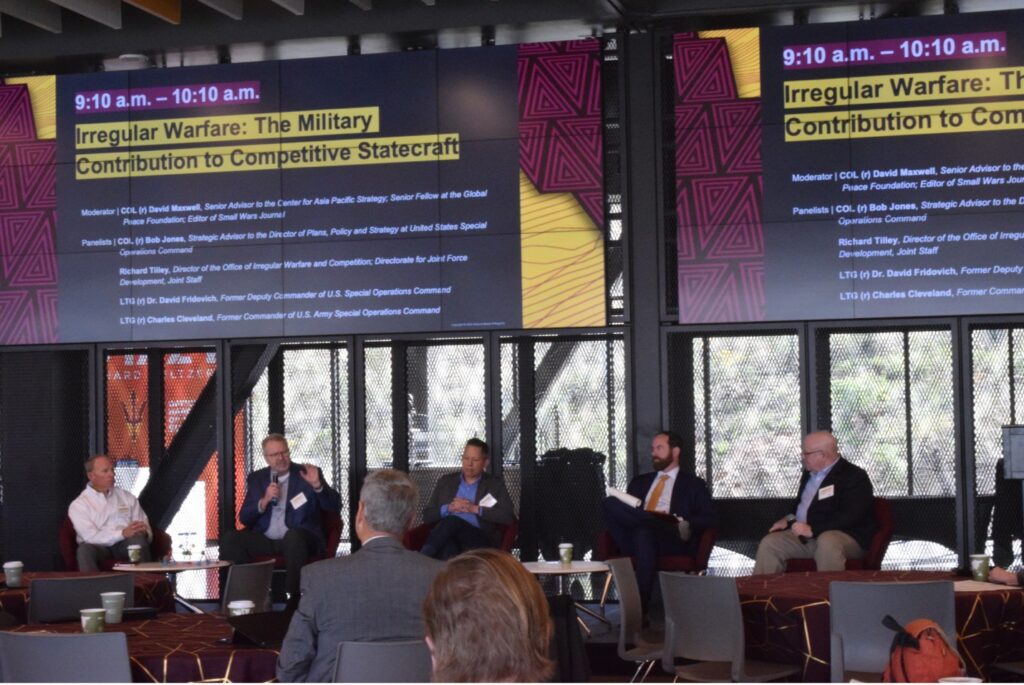
Information, Mis-, Dis-, and Mal-
Information has become a key instrument of national power in the current security environment. Adversaries use propaganda and disinformation to assault political will, manipulate public opinion, and erode socio-political institutions—direct assaults on the sovereignty of democracies in ways and at scales not seen before. What are the national strategic implications of these changes in the information environment? How must diplomacy change when nation-states have direct access to foreign populations? What capabilities exist or need to be developed to defend against malign influence campaigns? What responsibility does industry have for how their tools and platforms are used?
Moderator | Professor Henry Olsen, Washington Post columnist, Senior Fellow at the Ethics and Public Policy Center, Thomas W. Smith Distinguished Scholar in Residence at ASU
Panelists | Professor Steve Corman, Director of ASU’s Center for Strategic Communication Professor Scott Ruston, Director of ASU’s Center on Narrative, Disinformation & Strategic Influence, Research Professor with ASU’s Global Security Initiative
Professor Mi-Ai Parrish, CEO of MAP Strategies Group, Professor for Media Innovation and Leadership at the Walter Cronkite School of Journalism and Mass Communication
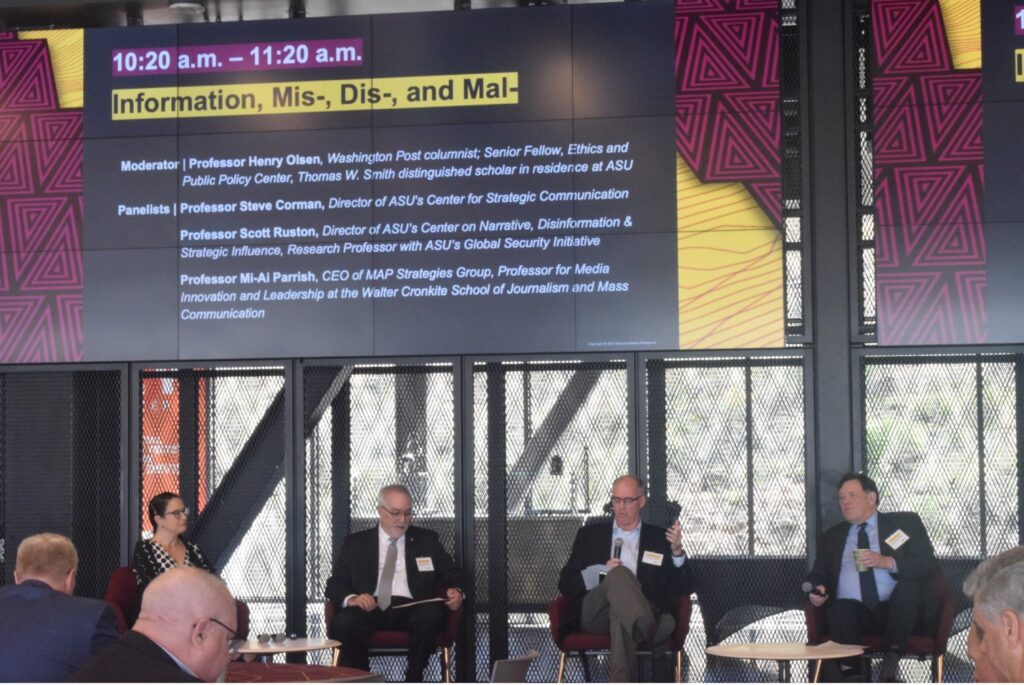
Rediscovering Deterrence: Nuclear, Integrated, Irregular
With the U.S. facing aggressive, nuclear-armed, and near-peer threats in both the European and Pacific theaters, strategists are discovering that deterrence as a field of study has atrophied significantly since its Cold War heyday. What is the current state of deterrence theory? How does nuclear deterrence relate to “integrated deterrence” and “unconventional deterrence”? How can we reinvigorate the field for maximum effect?
Moderator | Daniel Rothenberg, Co-Director of the ASU Center of the Future of War; Professor of Practice at the School of Politics and Global Studies; Senior Fellow at New America
Panelists | Professor Wyn Bowen, Co-Director of the Freeman Air and Space Institute, King’s College London
Mallory Stewart, Assistant Secretary for the Bureau of Arms Control, Verification, and Compliance (AVC) at the U.S. Department of State
Elisabeth Braw, Senior Fellow at the American Enterprise Institute (AEI)
LTC Nathan Finney, Army Strategist, Strategy Branch Chief, U.S. Indo-Pacific Command

Interagency Campaigns: Are We There Yet?
The campaign is central to our definition of competitive statecraft and increasingly central in the approaches outlined in the National Security Strategy and National Defense Strategy. The military has long experience planning and executing campaigns during conflict, but we have not yet cracked the code on campaigning during peacetime or across all instruments of national power. Why not? What are the obstacles? Are there any counterexamples worth learning from? How can we improve?
Moderator | Professor Ryan Shaw, Professor of Practice in History and Strategy, Managing Director of Strategic Initiatives and Senior Advisor to ASU President Michael Crow
Panelists | Ambassador Tom Shannon, Former Acting Secretary of State and Under Secretary of State for Political Affairs
LTG (r) Frederick Rudesheim, Former U.S. Security Coordinator for Israel and the Palestinian Authority; Former Commander, U.S. Army South
Ambassador James Carouso, Senior Advisor to the Australia Chair at CSIS; Former Foreign Policy Advisor to U.S. Indo-Pacific Command; Former Chargé d’ Affaires at the U.S. Embassy in Canberra and U.S. mission to the Association of Southeast Asian Nations
Liza Tobin, Senior Director for Economy at the Special Competitive Studies Project; Former China Director, National Security Council

Closing Keynote Address
Speaker | Ylli Bajraktari, CEO, Special Competitive Studies Project

Wrap Up and Way Ahead
Facilitator | Dr. Viva Bartkus, Paul E. Purcell Associate Professor of Management at the University of Notre Dame
